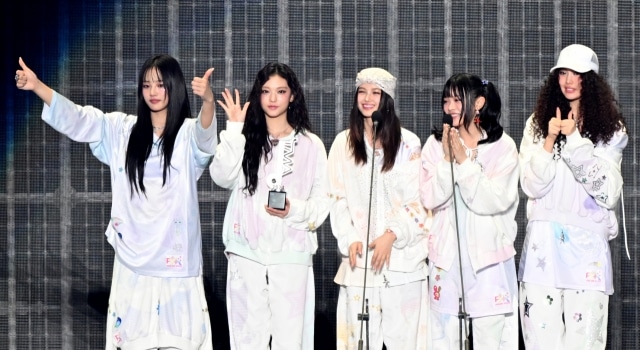
NewJeans comments on their thoughts after being selected as the “Worldwide Icon” at the “2024 The Fact Music Awards” held at Kyocera Dome in Osaka, Japan, on Sunday. Image: TMA via The Korea Herald
K-pop idols are increasingly succumbing to illness and exhaustion as they face the relentless pressure of participating in a growing number of music awards, where the demands for performances, rehearsals, and public appearances are higher than ever. As the competitive nature of the industry pushes them constantly to excel and maintain a flawless image, many artists are experiencing the physical and mental toll of this grueling schedule, raising serious concerns about their long-term health and the sustainability of their careers.
According to the Korea Music Content Association (KOMCA), there are over 20 major music award ceremonies this year, hosted by content companies, music streaming platforms, music-related organizations, and media outlets in South Korea. In contrast, the United States — the world’s largest music market — hosts only three major ceremonies: the Grammy Awards, Billboard Music Awards, and American Music Awards, making the number of K-pop award shows seem excessive.
And the number of K-pop award ceremonies continues to grow. In the past five years alone, more than five new award shows have launched, with an additional three to four set to debut this year.
Local entertainment companies feel immense pressure to participate, particularly in events organized by media companies.
Stray Kids perform at the 2023 Billboard Music Awards on Sunday. Image: JYP Entertainment via The Korea Herald
“There’s a sense of pressure on our end, but media outlets use their influence to secure artists for their events. That’s why, earlier this year, KOMCA released a statement suggesting contracts be drawn for participation in award shows,” an official from one of the top three K-pop powerhouses said on Monday.
With K-pop performances in high demand, the costs of featuring artists in full-scale productions have skyrocketed. As a result, award shows organized by media outlets have adopted an “omnibus” concert format.
“Rather than simply awarding prizes, many award shows sell tickets and force K-pop stars to perform,” the official added.
Another local entertainment company official highlighted the strain that comes from the extensive preparation required for participation in awards shows.
“K-pop artists must dedicate several days, sometimes even weeks, to behind-the-scenes preparations just for a few minutes of performance. The reality is that artists and creators are forced to invest significant amounts of time and resources into preparing for these shows, which detracts from their primary focus, creating original content,” the official said.
Pop culture critic Jung Deok-hyun echoed these concerns, noting that while award shows themselves aren’t inherently problematic, the pressure to participate can have negative consequences.
“The key issue is ensuring that the musician’s free will is respected. If an artist is invited to a prestigious event like the Grammys, they would naturally want to attend. But when it’s not that level of recognition, participation comes with physical and time-related costs. With back-to-back award shows, the physical toll on artists rises, and as schedules overlap, the risk of accidents and health issues increases,” Jung said on Monday.
In response to these growing concerns, KOMCA launched the Council for the Improvement of Music Award Ceremonies in May, as part of a broader initiative to establish guidelines for K-pop awards ceremonies. This move followed a March statement in which KOMCA expressed concerns over the rising number of award shows. The council aims to set guidelines for awards ceremonies and develop a standardized contract for artist participation, promoting self-regulation within the industry.